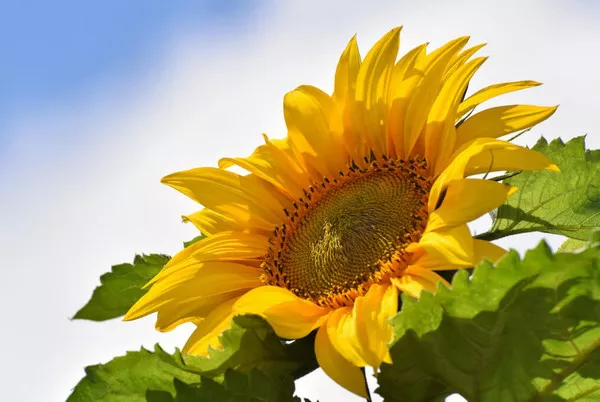Sunflowers, with their vibrant golden petals and distinctive dark centers, are not just a symbol of beauty; they are a source of incredible versatility and productivity. Beyond their ornamental appeal, sunflowers have been cultivated for centuries for their diverse range of products that contribute to various industries. From the kitchen to the cosmetic counter, sunflowers produce a wealth of offerings. In this exploration, we unveil the multitude of products that these cheerful blooms bestow upon us, showcasing the richness of the sunflower harvest.
Sunflower Seeds: A Nutritious Powerhouse
At the heart of the sunflower’s productivity lies the sunflower seed, a small but mighty powerhouse of nutrition. Sunflower seeds are not only a popular snack but also a valuable source of essential nutrients. Packed with protein, healthy fats, and a variety of vitamins and minerals, these seeds are a nutritious addition to any diet. Roasted sunflower seeds are a beloved snack enjoyed worldwide, offering a satisfying crunch and a rich, nutty flavor. In addition to being a tasty treat on their own, sunflower seeds can be sprinkled over salads, yogurt, or incorporated into various dishes to enhance both flavor and nutritional content.
Sunflower Oil: Liquid Gold in the Kitchen
One of the most well-known and widely used sunflower products is sunflower oil, often referred to as liquid gold in the culinary world. Extracted from sunflower seeds, this light and versatile oil have a mild flavor that makes it suitable for a variety of culinary applications. Sunflower oil is commonly used for sautéing, frying, and baking, thanks to its high smoke point and neutral taste. It is also a popular choice for salad dressings and marinades. Beyond the kitchen, sunflower oil is a key ingredient in many skincare and cosmetic products, highlighting its gentle and nourishing properties.
Sunflower Meal: A Protein-Rich Byproduct
After the oil extraction process, what remains is sunflower meal, a byproduct that doesn’t go to waste. Sunflower meal is rich in protein and is often used as a supplementary animal feed for livestock. Its high protein content makes it a valuable component in animal nutrition, contributing to the health and development of various farm animals. The efficient use of sunflower seeds to produce both oil and protein-rich meal exemplifies the sustainable and resourceful nature of sunflower cultivation.
See Also: How to plant flowers in a planter?
Sunflower Hulls: A Renewable Energy Source
The outer layer of the sunflower seed, known as the hull, may be considered a waste product in some contexts, but its potential extends far beyond the field. Sunflower hulls are recognized for their energy content and are utilized as a renewable energy source. Through a process called gasification, sunflower hulls can be converted into bioenergy, generating heat and power. This sustainable approach not only minimizes waste but also contributes to the reduction of reliance on non-renewable energy sources.
Sunflower Lecithin: A Natural Emulsifier
Within the sunflower seed, a lesser-known yet valuable component is sunflower lecithin. Extracted from the oil, sunflower lecithin serves as a natural emulsifier and stabilizer in various food and cosmetic products. In the food industry, it is commonly used in chocolate production to prevent cocoa and cocoa butter from separating. In cosmetics, sunflower lecithin is utilized for its emollient properties, contributing to the smooth texture of skincare products. Its natural origin makes it an appealing alternative to synthetic emulsifiers in the formulation of a wide range of consumer goods.
Sunflower Wax: A Plant-Based Alternative
Another remarkable product derived from sunflowers is sunflower wax. Extracted from the deoiled sunflower cake, this natural wax finds applications in the cosmetic and skincare industry. Sunflower wax serves as a plant-based alternative to beeswax in various formulations, such as lip balms, lotions, and creams. Its emollient properties contribute to the texture and consistency of cosmetic products, providing a sustainable option for those seeking plant-derived alternatives.
Sunflower Petals: A Splash of Color
While the primary focus is often on the seeds, the petals of the sunflower also have their own unique contributions. Sunflower petals are edible and can be used to add a splash of color and a mild, slightly bitter flavor to salads, soups, and other culinary creations. Their vibrant yellow hue adds visual appeal to dishes, making them a delightful and edible garnish. Beyond the kitchen, sunflower petals are also employed in herbal teas, infusions, and potpourri, showcasing their versatility in both culinary and decorative applications.
Sunflower Honey: A Sweet Harvest
When sunflowers are in bloom, they become a haven for bees, contributing to the production of a distinct and flavorful honey known as sunflower honey. This golden-hued honey carries the essence of sunflowers and their nectar, resulting in a unique and delightful taste. Sunflower honey is prized for its light floral notes and is often enjoyed as a spread, drizzle, or sweetener in various culinary creations. Its production not only adds sweetness to our lives but also underscores the crucial role sunflowers play in supporting pollinators and biodiversity.
Conclusion
In conclusion, the sunflower, with its cheerful demeanor and striking appearance, is not just a visual delight but a source of an incredible array of products. From the versatile seeds that provide nourishment to the oil that graces our kitchens, and from the petals that add color to our plates to the wax and lecithin that enhance our cosmetics, sunflowers bestow a bounty that extends far beyond their ornamental appeal. The sustainable use of sunflower byproducts for energy and animal feed further emphasizes the resourcefulness of this remarkable plant. As we appreciate the beauty of sunflowers in gardens and fields, let us also celebrate the diverse and sustainable harvest they offer, enriching our lives in numerous ways.


